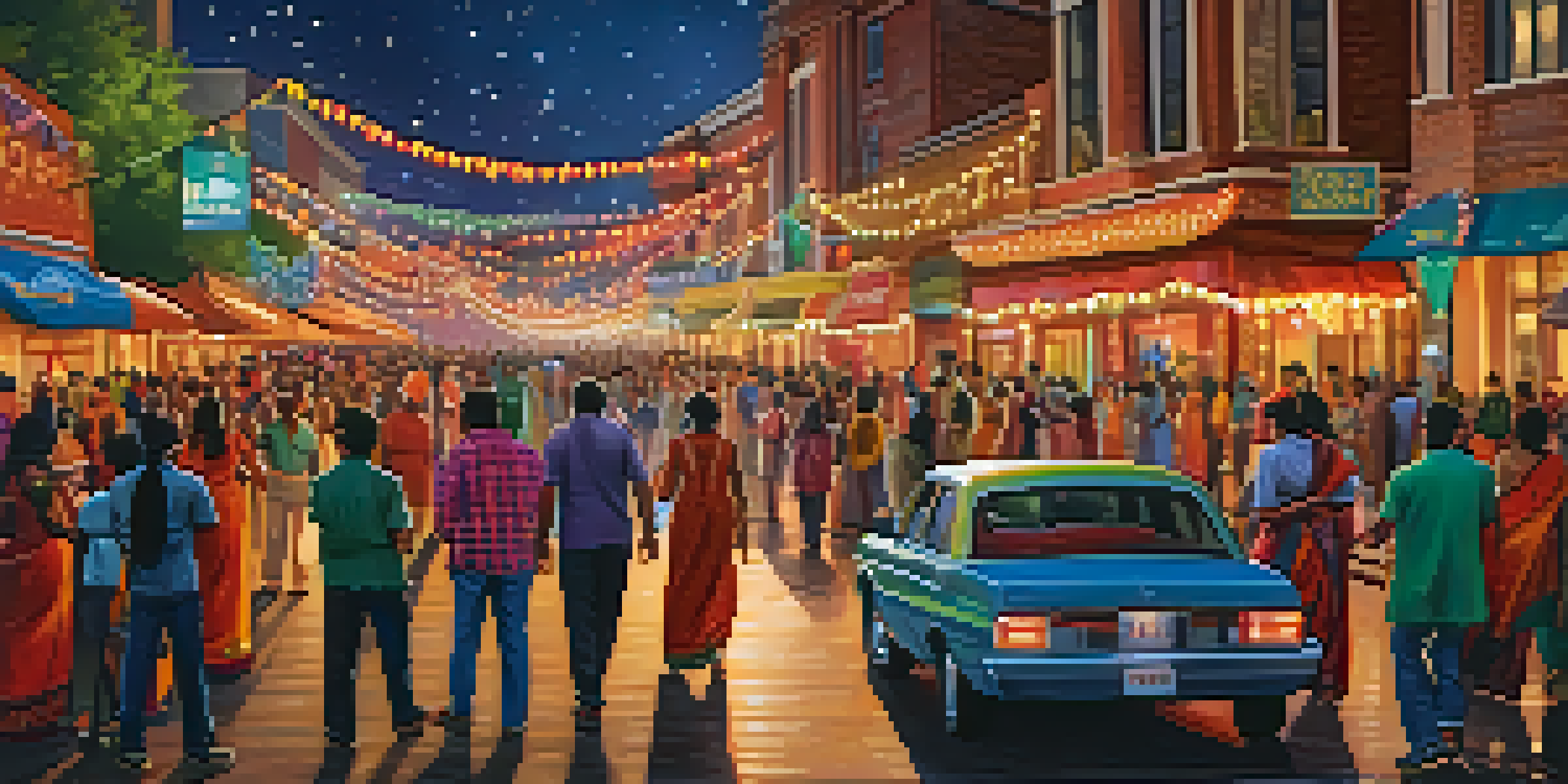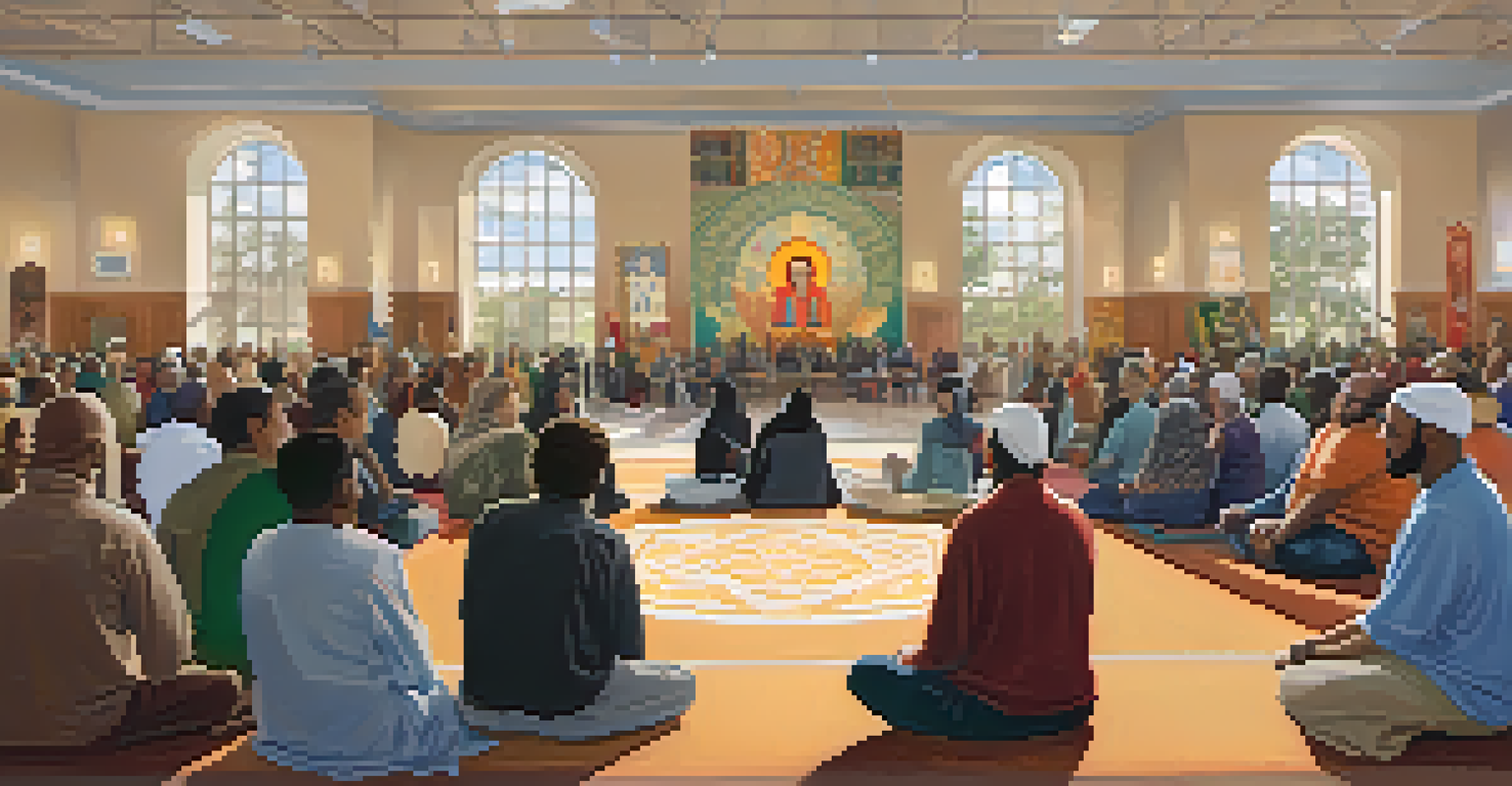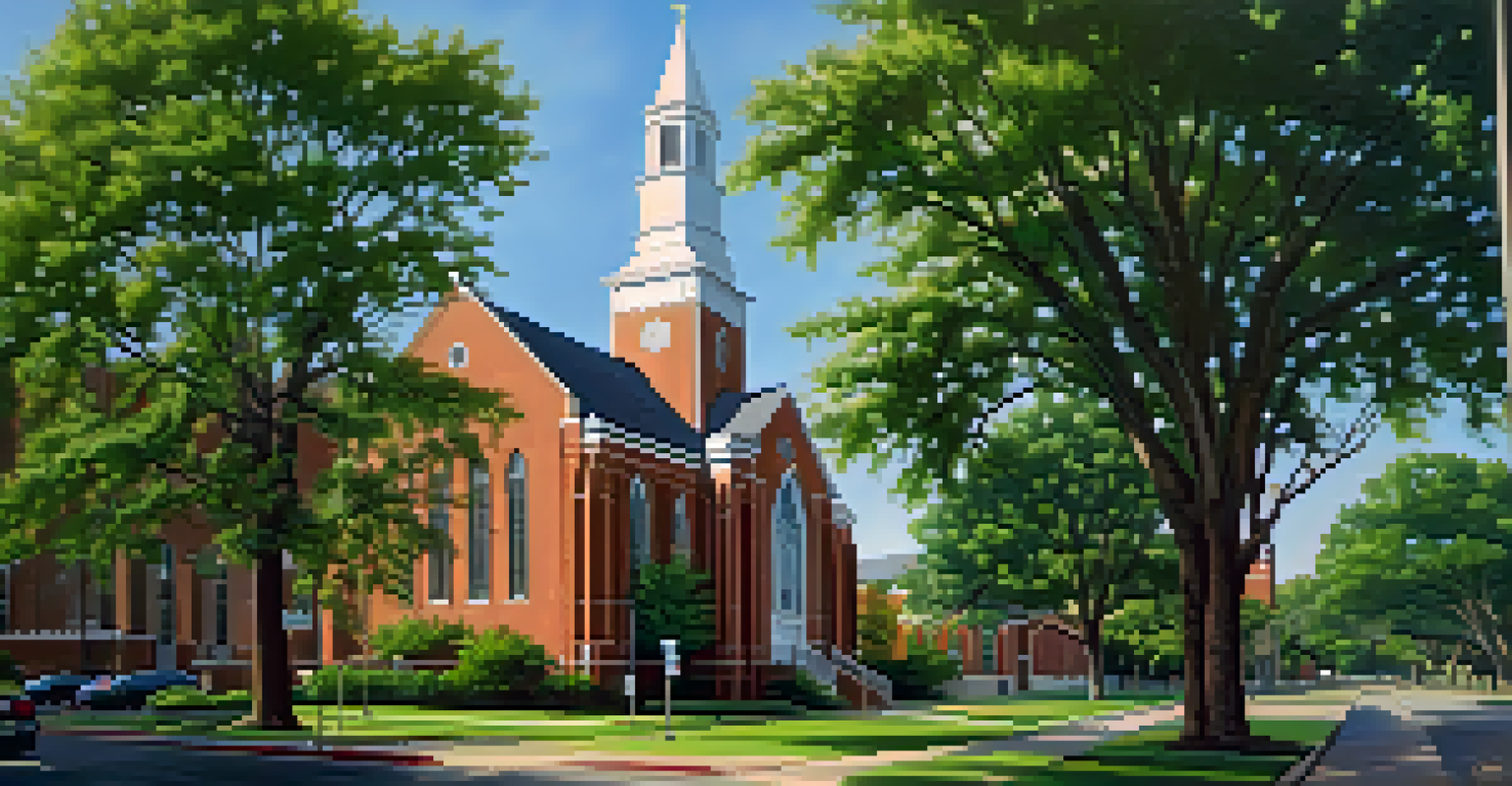The Role of Religion in Dallas's Cultural Landscape Today

The Historical Roots of Religion in Dallas
Dallas has a rich tapestry of religious history that dates back to its founding. The city was largely shaped by early settlers who brought their faiths, primarily Christianity, which laid the groundwork for many community values. Over the years, this religious foundation has evolved, welcoming a multitude of faiths that reflect the city’s growing diversity.
Faith is a bridge that connects people of different backgrounds and beliefs, fostering understanding and community.
Places like the historic First Baptist Church, established in the early 1900s, reveal how religion has been intertwined with Dallas's development. This church, among others, not only served spiritual needs but also became community hubs, influencing social and cultural dynamics. As Dallas expanded, so did its religious landscape, accommodating new immigrant groups and their beliefs.
Today, this historical context plays a crucial role in understanding the current cultural dynamics of Dallas. The city's religiously diverse population contributes to a vibrant cultural identity, showcasing how the past informs present-day interactions and community bonds.
Diverse Faiths Contributing to Cultural Diversity
Dallas is home to a variety of religious communities, ranging from Christianity to Buddhism, Islam, and Hinduism. Each of these faiths brings unique traditions, festivals, and practices that enrich the cultural fabric of the city. For instance, the Diwali festival celebrated by the Indian community showcases vibrant traditions that attract attendees from all backgrounds.

Moreover, these diverse religious practices foster intercultural dialogue, allowing residents to gain insights into each other's beliefs. This exchange not only promotes understanding but also strengthens community ties, as people engage in shared activities and celebrations. Such interactions often lead to collaborative events that highlight the beauty of diversity.
Diverse Faiths Enrich Dallas Culture
Dallas's rich tapestry of religious communities fosters cultural diversity and intercultural dialogue.
In this way, religion serves as a bridge, connecting people while enhancing Dallas's cultural scene. The presence of various faiths encourages a sense of belonging among residents, making the city a mosaic of traditions and narratives that reflect its rich diversity.
Religion and Community Engagement in Dallas
Religious institutions in Dallas often play a pivotal role in community engagement and social services. Many churches, mosques, and temples are at the forefront of providing support to those in need, organizing food drives, and offering educational programs. This commitment to service showcases how faith can inspire action beyond the walls of worship.
Diversity is the one true thing we all have in common. Celebrate it every day.
For example, the Islamic Community Center of Dallas not only serves as a place for prayer but also as a center for cultural exchange and community service. Their outreach programs address local issues, such as hunger and education, proving that religion can be a catalyst for positive change in society. This active involvement helps build stronger communities where people feel supported and valued.
Through these efforts, religious groups help foster a sense of belonging among residents, reinforcing the idea that faith can unite and uplift. The impact of these initiatives resonates throughout Dallas, demonstrating the essential role religion plays in addressing both spiritual and social needs.
Religious Influence on Arts and Culture
Religion significantly shapes the arts and cultural expressions in Dallas. From music to visual arts, many local artists draw inspiration from their faith, leading to unique creations that resonate with both religious and secular audiences. For instance, gospel music is a vibrant part of Dallas's cultural scene, celebrated through various festivals and events.
Art installations and performances often reflect religious themes, providing a means for individuals to explore and express their beliefs. The Dallas Arts District, with its galleries and theaters, frequently showcases works that highlight the intersection of faith and culture. This fusion not only enriches the artistic landscape but also invites dialogue about spirituality and its role in society.
Religion Drives Community Engagement
Religious institutions actively contribute to social services and community support, enhancing local well-being.
As religious influences permeate the arts, they contribute to a dynamic cultural environment, where diverse perspectives are celebrated. This interplay between faith and creativity enhances the city's identity, making Dallas a hub for innovative artistic expressions rooted in spirituality.
Interfaith Dialogues and Cooperation
In an increasingly diverse city like Dallas, interfaith dialogues have become essential for promoting understanding and cooperation. Various organizations and community leaders actively work to create spaces where people from different faiths can come together to share their beliefs and experiences. These dialogues foster mutual respect and pave the way for collaborative efforts to address social issues.
For instance, events like the Dallas Interfaith Council's annual gatherings encourage individuals from various religious backgrounds to discuss common values and challenges. This initiative not only strengthens relationships among different communities but also highlights shared goals, such as social justice and community service. The result is a collective effort to uplift the city as a whole.
Through these interfaith initiatives, Dallas showcases the power of unity in diversity. As religious leaders and community members engage in meaningful conversations, they create a more inclusive environment that values each person's beliefs, ultimately enriching the cultural tapestry of the city.
The Role of Religion in Daily Life
For many residents, religion plays a vital role in daily life, influencing decisions, relationships, and community involvement. People often turn to their faith for guidance, comfort, and a sense of purpose, shaping their interactions with others. This impact is evident in how individuals approach challenges and celebrate milestones within their communities.
Moreover, religious practices and traditions often serve as anchors in people's lives, providing a sense of routine and belonging. For instance, weekly services or gatherings become opportunities for social connection, reinforcing bonds among friends and families. These shared experiences create a strong sense of community, as individuals come together to support one another.
Challenges for Religious Communities
Religious groups in Dallas face challenges like declining membership and generational divides, pushing for innovative engagement strategies.
In this way, religion becomes more than just a personal belief system; it evolves into a communal experience that shapes the cultural landscape of Dallas. The intertwined nature of faith and daily life fosters an environment where individuals feel empowered to contribute to their communities, enhancing the overall quality of life.
Challenges Facing Religious Communities
Despite the positive impacts of religion on Dallas's cultural landscape, religious communities face various challenges. Issues such as declining membership, generational divides, and differing interpretations of faith can create tensions within and between communities. These challenges require leaders to adapt and find innovative ways to engage their congregations.
For example, many religious leaders are embracing technology to reach younger audiences, utilizing social media and online platforms for outreach. This shift helps bridge the generational gap and invites more people to participate in religious activities. However, balancing tradition with modernity can be a delicate task, requiring thoughtful dialogue and collaboration.

Addressing these challenges is crucial for maintaining the vitality of religious communities in Dallas. By fostering open conversations and finding common ground, religious groups can navigate these complexities, ensuring that faith continues to play a meaningful role in the city's cultural identity.